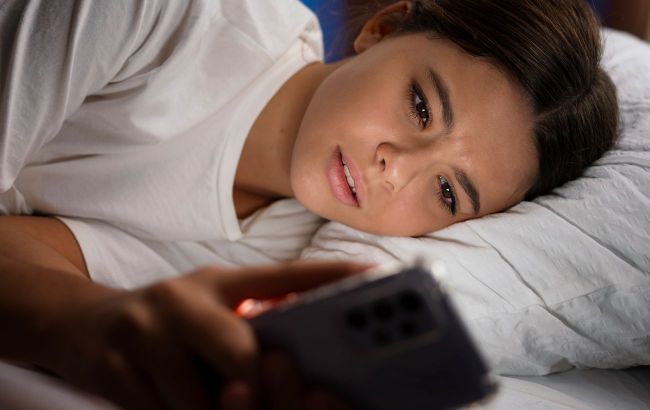Doctor names 3 harmful ways of using phone
 Three ways of using the phone are killing our health (photo: freepik.com)
Three ways of using the phone are killing our health (photo: freepik.com)
Harvard stress expert Dr. Aditi Nerurkar named three ways of using the phone "killing your brain". She explained that excessive use of bright phone screens and exposure to graphic content can contribute to stress, anxiety, and depression, reports the Daily Mail.
Night scrolling
An expert explained how the constant use of a mobile phone can negatively affect mental health due to a phenomenon known as "popcorn brain". This happens when the user tries to disconnect from the continuous stream of online information.
She argues that our desire to scroll through our phones is a "primal urge" to seek out danger that comes from feelings of stress.
"In recent times there's been a lot of bad news. In fact it feels like the onslaught of bad news, one thing after another, whether it's a climate disaster or a conflict in a certain part of the world or something or the other is always happening now. The information stream is rapid and unprecedented, and so we are constantly scrolling and scanning for danger," the expert explained.
"When we were all cave people, there was a night watch person. That person would sit by the fire while the tribe would sleep and that person would scan for danger to keep the tribe safe. In modern times, we have all become that night watch person and we scroll incessantly when we feel a sense of stress because it is our primal urge. It is the way our amygdala (parts of the brain responsible for processing emotional stimuli) feels a sense of safety because we are scanning for danger. But we are no longer in a tribe, we're not cave people anymore. So what do we do? We scroll, that is how we are scanning for danger, especially when we are feeling stressed," added Dr. Nerurkar.
Checking your phone frequently
Dr Nerurkar urged people to stop checking their phones immediately after waking up, as this leads to increased stress and addiction to mobile phones, which further increases stress.
"Most of us check our phones 2,600 times a day, that is a statistic... When you wake up, before your second eye is even open, you are scrolling. Studies show that 62 percent of people check their phones within 15 minutes of waking up and about 50 percent check them in the middle of the night. I'm guilty of this," she said.
The expert recommends limiting phone use to 20 minutes a day and 'set a timer if you have to for engaging and consuming'.
Consuming traumatic content
The doctor said that consuming traumatic content on social media can lead to emotional distress, post-traumatic stress and indirect trauma, especially for those working in journalism.
"Graphic images and videos on your phone can increase your risk of PTSD and mental health conditions, as it triggers the fight or flight response and can lead to indirect trauma," says Dr. Nerurkar.
Studies show that the risk of PTSD increases when you consume graphic images, even if what you're consuming is happening thousands of miles away, like any conflict, any climate disaster, anything.
"If you start consuming graphic images and videos you increase your risk of PTSD, even though you have not had any direct trauma because it's indirect trauma that you're seeing," explained the expert.
The more videos you watch or the more graphic content you consume, your amygdala activates, your initial urge to scroll starts to fail, and then you scroll not much and then scroll some more because you don't feel safe. This is a common occurrence.
Previously, we wrote about getting rid of anxiety and catastrophic thinking.
And they also talked about why we perceive friends as 'painkillers'.
This material is for informational purposes only and should not be used for medical diagnosis or self-treatment. Our goal is to provide readers with accurate information about symptoms, causes, and methods of detecting diseases. RBС-Ukraine is not responsible for any diagnoses that readers may make based on materials from the resource. We do not recommend self-treatment and advise consulting a doctor in case of any health concerns.

